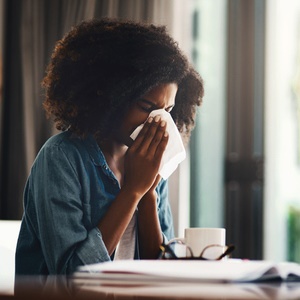
When your body is extra sensitive to a substance, it will respond in the form of an allergic reaction. Whether it’s a food allergy or pollen in the environment that causes hay fever, allergies are enough to drive anyone insane.
Here are a couple of tips we have put together to help you cope.
1. Is it actually an allergy?
First establish whether your lingering sinusitis symptoms are a cold or allergy. It is easy to misdiagnose yourself and cover up the symptoms with over-the-counter solutions instead of getting to the root of the problem.
One of the best indicators whether sinusitis is caused by a viral infection or an allergy is the duration of your symptoms. Cold or flu symptoms caused by a viral infection will clear up in anywhere between a few days up to a week or two, but the symptoms of seasonal allergies can last for months.
If you experience sinusitis symptoms, such as headaches and congestion, a doctor will differentiate between acute sinusitis, which lasts for less than three weeks and is often infectious, and chronic sinusitis, which can last for months and is mostly likely caused by allergies.
An allergy will also most likely be accompanied by an itchy throat, eyes or ears, whereas this isn’t always present in a cold.
2. Start taking your allergy medication before your symptoms kick in
Dr Adrian Morris, Health24's resident allergy expert, suggests taking antihistamines before the beginning of pollen season so that you can start building tolerance before the dreaded symptoms start.
According to Dr Andrew Murphy, allergy specialist at Chief County Hospital, Pennsylvania, you should take your medication at least 30 minutes before heading outdoors. You should also check in with your medical professional if you feel that your medication no longer controls your symptoms so that this can be adjusted according to your needs.
3. Clean, clean and clean some more
The less dust and pollen in your house, the better. Vacuum often, consider replacing carpeted floors with hardwood or tiles and make sure that those often-overlooked nooks and crannies, such as skirting boards, are regularly wiped off. Be careful of mould, especially in damp, rainy environments.

4. Do not underestimate the use of a neti pot, steam or sinus rinse
Steam, humidity and heat break down the mucus and relieve congestion, and many doctors will recommend steaming or a sinus rinse to relieve your symptoms.
Want to give a neti pot a go? It's even better than steam on its own, say the medical experts. "Nasal irrigation is in sinus care," says Dr Len Horovitz, an internist at Lenox Hill Hospital in New York City. "Saline solution can be easily mixed and utilised with a neti pot or other irrigation devices. Simple saline mists only moisturise, while steam can cause swelling of membranes. Heat provokes swelling, so that can be harmful."

5. Consult your doctor for any form of persistent cough or chest problem
Even if you think your cough is caused by nasal drip, you should consult your doctor to rule out any infections or an underlying medical condition, especially if you are physically active and exercise frequently. Any tightness in the chest can also point to asthma, which can be treated with an inhaler.
Dr Keertan Dheda, Health24’s resident cough expert, says that it’s especially important that a cough that lasts longer than four weeks be checked out as there are specific illnesses that need to be excluded.
6. Learn how to read food labels carefully
Do you suffer from a food allergy? Learn how to spot hidden allergens in processed products. Usually it is required that the top eight food allergens are listed on packaging (milk, egg, peanuts, tree nuts, wheat, soy, fish, shellfish), but where regulations aren't as strict, these ingredients may be missed.
7. Scrub the day off
Take off your shoes, have a shower and change your clothes as soon as you step inside the house. This will minimise the amount of pollen you bring indoors.
8. Invest in a dehumidifier
You have probably been told that a humidifier will improve your breathing, but a dehumidifier could actually work better if your allergies are triggered by dust or mould, especially in a humid area.
9. Know your indoor triggers
Don’t just assume that it’s pollen and dust from the outside that’s messing with your allergies. Factors like dust mites, pet dander and mould can make allergies worse. Know what your triggers are and try to minimise these allergens inside your home by cleaning regularly.

10. If all else fails, consult an allergist
If you’ve tried countless over-the-counter remedies and tips but nothing seems to be working, it might be time to call in the big guns. Allergy specialists can do testing to determine the exact triggers of your allergies. Dr Morris runs his own allergy clinics from Cape Town and Johannesburg where these tests are done.
Image credit: iStock




 Publications
Publications
 Partners
Partners











